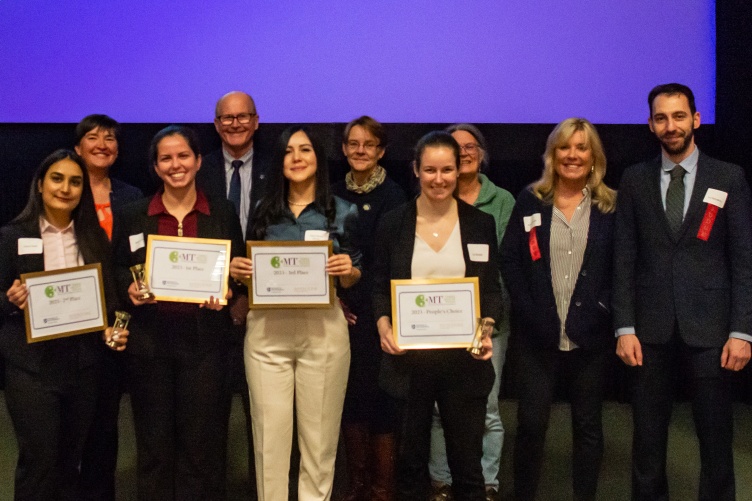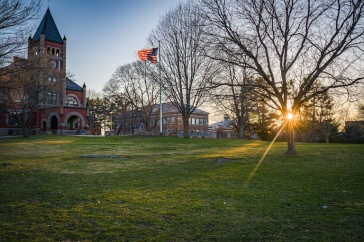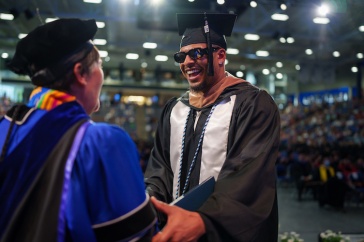
On a recent Thursday afternoon, over 100 people packed the University of New Hampshire’s Theatre II in the Memorial Union Building to watch the finals of the annual Three Minute Thesis competition. The Three Minute Thesis, or 3MT, is a competition where graduate students have three minutes to explain their research in language that is accessible to a non-specialized audience. This was the eighth annual 3MT competition taking place on campus, and this year there was considerable enthusiasm, in part because of a generous donation from the Riverstone Group, and in no small part due to the eagerness of students to try their hand at the challenge.
Estefania Yzar Garcia, a master’s student in biochemistry was attending the competition as a finalist. “It’s super interesting,” she explains. “It’s a fun way to present my research in a way that I’m not used to.”
Freedom Scott Tansley, a master’s student in recreational administration, said he was excited to present in order to bring more attention to his field. “Recreational science is underrepresented in the larger science community,” he says. “I’m putting it out there that it’s important.”
Altogether, 13 students were chosen to compete in the final round on Thursday, representing fields as diverse as marine biology, composition and rhetoric, and electrical and computer engineering.
The dean of the Graduate School, Cari Moorhead, moderated the competition, which was also livestreamed on Zoom. There were five judges, three of whom are part of the UNH community: UNH President James W. Dean, Jr., Julie Simpson, director of research integrity services, and Ivo Nedyalkov, lecturer in mechanical engineering.
In addition, Karen Walker, former deputy general counsel for the Ernst & Young Global Network, and Andrea Colville, CEO of Brodeur Partners, rounded out the judging panel. The competitors, using just one visual slide, were judged on their comprehension, content, engagement and communication skills, all while fitting the talk into the three minute time slot.
When it was time to announce the winners, President Dean addressed the crowd, saying that all the judges felt there was a higher quality across the board in the presentations this year from previous years, and that there was also a much tighter distribution of scores.
First place, and a $1,000 award, went to Melanie Smith, a master’s student in marine biology, for her presentation on using underwater microphones to study the acoustic ecology of humpback whales. This research will aid in the understanding of how to manage boating vessels so that humpback whales are better protected. Thrilled about her win, Smith debriefed a bit after the competition, saying she really benefitted from the thoughtful workshops, including one with an acting professor who helped her to maintain composure. “People always tell you to stay calm or to take a deep breath,” she says, “but the workshop gave us real steps for how to do it.”
In second place was Manjot Rekhi, an Earth and environmental science Ph.D., for her research creating a nitrogen storage bank in mineral-associated organic matter, in order to prevent pollution from excessive nitrogen use. She won $750. Third place went to Diana Reyes Gomez, an agricultural sciences Ph.D., for her research feeding cows seaweed from the Gulf of Maine in order to reduce their methane emissions. Ava Boutilier, a master’s student in biochemistry, won the People’s Choice Award for her research studying the effects of macrophages in Waldenström's macroglobulinemia, a type of cancer. Both third place and People’s Choice received a $500 award.
During a Q&A at the end of the event, finalists took some time to share their experiences preparing for the 3MT with the audience.
“It was one of the most fun experiences,” finalist Caroline Hall, an English Ph.D., said. Hall added “one of the best things is that it’s a competition where your competitors are also your team. And it’s an awesome team. When people on the team succeed, I succeed.” There were nods of agreement all around.
Jovana Milosavljevic Ardeljan, director of Career, Professional and Community Development at the Graduate School, and a 3MT organizer, has seen this strong sense of cohesion before. As part of the process, Milosavljevic Ardeljan offers one-on-one meetings as well as group coaching sessions to push students to improve and polish their presentations. “Once they start sharing with each other and giving suggestions,” she says, “I think they all forget it's a competition and really want to make everyone's presentation better. They become a team.”
Matt Kunish, Riverstone Group’s chief business development officer, was pleased with the outcome of the competition. Kunish said that the four-year partnership between Riverstone and UNH’s 3MT is strong because “I understand the importance of translating a technical subject to a wider audience. It resonates.” He also applauded the way the grant money was spread out across participants. Instead of a winner-takes-all approach, he appreciated that participants received money for attending workshops or for placing in the first and final rounds. This added, he thought, to the team mentality. In all, 51 students were able to receive a monetary award for their participation in this year’s 3MT.
-
Written By:
Sarah Earle | Graduate School | sarah.earle@unh.edu
















































